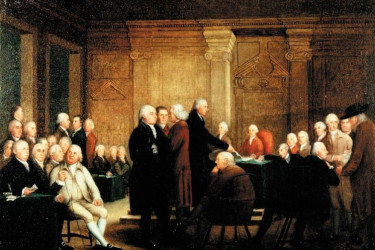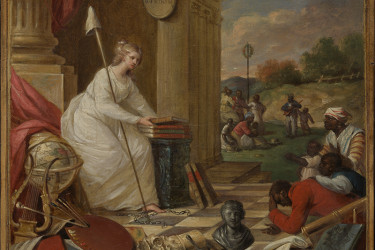Later in the service, Laurie lectured explicitly on revival and revolution, invoking one of the most popular preachers of the first Great Awakening:
One of our founding fathers named George—not Washington but Whitefield, an evangelist from England—preached the Gospel and thousands of colonists came to faith in Christ and it brought about moral change in a culture as a revival always does…. We were able to sow the seeds of this new nation in that receptive soil of morality based on a faith in God. I don’t think we could have done it without it…. [N]ot only are we founded with revival, we need to have another revival.
Laurie is not the only Evangelical these days making connections between the First Great Awakening and the Revolution. Texas senator Ted Cruz says that a Great Awakening is coming, and it will propel Christians into “cultural prominence.” Missouri senator Josh Hawley told activist Ralph Reed’s Faith and Freedom Coalition that “in every hour of this country’s danger...Christians have risen to help lead this country.... We did it in the First Great Awakening, that helped move this country toward revolution and independence.” Veteran Christian Right activist James Robison summed it up with this 2021 tweet: “In light of our current national economic crisis, political chaos and military inferiority, I can safely say our only hope of survival is revival, leading to the next Great Awakening.” And when a revival broke out earlier this year at tiny Asbury University in Wilmore, Kentucky, MAGA evangelists, prophets, and politicians told their followers that the “outpouring” was the beginning of the long-awaited awakening that God was sending to save America.
Did the First Great Awakening have anything to do with the Revolution? Evangelicals are not the first to think so. The thesis comes from Alan Heimert’s 1966 book Religion and the American Mind. Heimert, a Harvard English professor at the time, suggested, by way of a literary reading of eighteenth-century sermons, that Evangelical Calvinists triggered the American Revolution by preaching an egalitarian “New Birth” that taught colonists to rebel against the established authority of local clergy. First Great Awakening sermons laid the intellectual groundwork and prepared the American “soil,” to use Laurie’s word, for a radical and democratic revolution. According to Heimert, eighteenth-century liberal Christians, the opponents of the Great Awakening, were too conservative in the way they fused their political ideas with Protestant Christianity to ever invoke a revolution. He described them as the “most reluctant of rebels.”



















